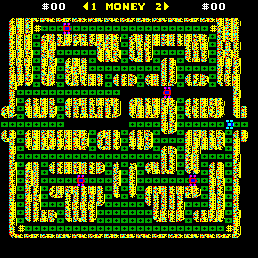 The Game: You’re on the run from the long arm of the law, and the police radio dispatchers have put an an APB out for you. Money lines the city streets, and you must evade the cop cars and stash away all the cash until the screen is cleared. Four special items in the corners of the screen enable you to turn the table on your pursuers and temporarily eliminate them from the screen – but they’ll be back. If the police cars catch you, you have the right to remain silent; if they catch your last getaway car, you have the right to see “game over” on the screen. (Pacific Novelty, 1981)
The Game: You’re on the run from the long arm of the law, and the police radio dispatchers have put an an APB out for you. Money lines the city streets, and you must evade the cop cars and stash away all the cash until the screen is cleared. Four special items in the corners of the screen enable you to turn the table on your pursuers and temporarily eliminate them from the screen – but they’ll be back. If the police cars catch you, you have the right to remain silent; if they catch your last getaway car, you have the right to see “game over” on the screen. (Pacific Novelty, 1981)
Memories: 1981 was the summer of Pac-Man Fever in the United States. Midway, who licensed the game from Namco, had to contend with any number of challenges to its sovereignty as the sole distributor of Pac-Man, from bootlegged rip-off ROMs such as Pirhana to games like Thief which, while they didn’t pirate the actual game code of Pac-Man, certainly lifted its basic game play concept wholesale. These were the days before the video game industry was bogged down by lawsuits for every day of the week. It was a wild frontier, and it seems somehow appropriate that Thief fits in that genre.
To differentiate it from other game companies’ Pac-alike output, Pacific Novelty – an outfit that only made a brief foray into coin-op video games – introduced a new element in the form of a loop of “police radio” voices performed by actors, which would play during the game in an attempt to lend some authenticity to the game. (A bit of an urban legend has persisted down through the years, perpetuated in Van Burnham’s book “Supercade”, that the loop was an actual recording of L.A.P.D. police radio, but this is not the case.) The game play was virtually identical to Pac-Man.
 Thief is a nice standout from the Pac-alike herd, but to be completely honest, the police radio gag wears thin in time. With the exception of Journey‘s use of a pre-recorded tape of Journey music, Thief almost becomes an evolutionary cul-de-sac – a glimpse at an analog solution to the problem of digital sound not being that exciting just yet.
Thief is a nice standout from the Pac-alike herd, but to be completely honest, the police radio gag wears thin in time. With the exception of Journey‘s use of a pre-recorded tape of Journey music, Thief almost becomes an evolutionary cul-de-sac – a glimpse at an analog solution to the problem of digital sound not being that exciting just yet.

